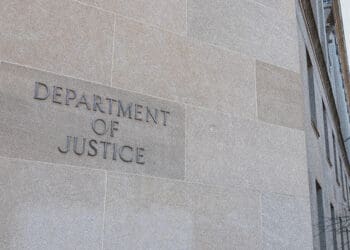A U.S. District Court appeared to undermine an important aspect of FCPA cases – the determination of whether a foreign national can be considered a U.S. agent – in a November decision to dismiss charges against a Swiss wealth manager. Explanation for this move is scant, and questions abound.
On November 10, 2021, Senior U.S. District Judge Kenneth Hoyt of the United States District Court for the Southern District of Texas granted a motion to dismiss the indictment of Daisy T. Rafoi-Bleuler, a resident and citizen of Switzerland, finding that the court lacked subject matter jurisdiction over U.S. Foreign Corrupt Practices Act (“FCPA”) charges against her. Specifically, the court held that the Indictment did not allege facts sufficient to establish that she was an “agent” of the U.S.-person defendants and their U.S.-based entities, with whom she was alleged to have conspired to violate the FCPA, and that in the absence of an agency relationship with those U.S. persons and entities she was not within the reach of the statute.
In the alternative, the Court held that even if she was an agent of the U.S. defendants, the use of the term “agent” in the FCPA was unconstitutionally vague as applied to her. Following on last year’s decision in United States v. Hoskins, 2020 WL 914302 (D. Conn. Feb. 26, 2020), in which a district court threw out a jury’s verdict on the ground that the government’s evidence at trial had been insufficient to establish agency under the FCPA, the Rafoi-Bleuler decision suggests that courts will carefully scrutinize the government’s assertion of FCPA jurisdiction over a foreign defendant on an agency theory. Beyond that, however, the Rafoi-Bleuler decision’s reasoning has evident weaknesses that will make it difficult for future defendants to rely on.
Rafoi-Bleuler’s Defense
In Rafoi-Bleuler, the DOJ alleged that various individuals associated with the Venezuelan state-owned oil company, Petroleos de Venezuela, S.A. (“PDVSA”), and two of its wholly-owned U.S.-based subsidiaries awarded contracts to service providers in exchange for kickbacks. The DOJ further alleged that Rafoi-Bleuler, a wealth manager in Switzerland, acted as an “agent” for various of the U.S.-person defendants and their U.S.-based entities to set up various bank accounts in Switzerland and other foreign locations to launder the illegal kickbacks gained from the corrupt bidding process. It was this supposed agency relationship with a U.S. principal that the DOJ contended gave the court jurisdiction over Rafoi-Bleuler under the FCPA.
Rafoi-Bleuler moved to dismiss the FCPA charge under Rule 12 of the Federal Rules of Criminal Procedure, asserting that there was no jurisdiction because she was not an agent of the U.S. defendants. The district court granted the motion on two different grounds.
First, the court found that the indictment did not sufficiently allege an agency relationship. Although the court recognized that the indictment expressly alleged that Rafoi-Bleuler “was an agent of a domestic concern,” it held that that allegation alone was not enough. Rather, according to the court, “an agency does not exist” “[a]bsent direct or undisputed evidence” of “mutual assent and control over the details of the person and agency, such that the principal controls the details over the assignment.” This type of relationship should be distinguished, in the Court’s view, from “other types of professional relationships.” According to the court, the indictment’s allegations concerning the relationship between Rafoi-Bleuler and her supposed U.S. principals—that she helped them open accounts and receive money—was insufficient to meet this test.
Second, and in the alternative, the court went further and found that the term “agent” under the FCPA was unconstitutionally vague as applied to Rafoi-Bleuler, and that the DOJ’s agency theory in the case was “such a novel application that no court has interpreted the statute or rendered a judicial decision that fairly discloses the manner in which the term may be applied to establish jurisdiction” and “[t]hat fact alone establishes the vagueness of the term.”
A Rebuff to DOJ Tactics, But Appeal Has Potential
Along with Hoskins, this case marks another instance of a court giving close scrutiny to and ultimately rejecting an attempt by the DOJ to stake out an aggressive position on agency in charging a foreign defendant under the FCPA. That said, the decision may well be successfully appealed by the DOJ and, even if not, the flaws in its reasoning are apparent. At no stage in a criminal case is the DOJ required to prove any element of its charge—relating to agency or anything else—with “direct or undisputed evidence.” The law draws no distinction between direct and circumstantial evidence, and the government’s evidence need not be undisputed in order to be sufficient to convict. Thus, the district court was holding the government’s proof of agency to too high a standard even had this been a post-trial motion, as in Hoskins. But this was a motion to dismiss the indictment, making the notion of evaluating “evidence” entirely out of place.
Moreover, as to the government’s allegations, the court did not offer any particular analysis as to why, as a matter of law, the alleged relationship between Rafoi-Bleuler and the U.S. defendants could not have been one of agency. As even the Hoskins court recognized: “Agency analysis is ‘highly-factual and often nuanced.’” Ordinarily, that would mean the question is one for the jury; but, at minimum, one would expect a decision dismissing at the indictment stage to carefully analyze what it was about the indictment’s allegations that made clear that no agency relationship was possible. The court did not do so. Implicitly, the court may have concluded that Rafoi-Bleuler acted as an arms-length professional rather than someone under the control of the U.S. defendants. But what the court ultimately said it found lacking was that the defendant was not alleged to have committed any act in the United States and, thus, “no agency relationship is established in the United States by the [defendant’s] alleged acts.” The court did not explain why, in its view, an individual needed to have committed an act in the United States in order to be the agent of a U.S. concern.
Finally, as to the court’s vagueness ground, the law of agency is well defined, so it is difficult to understand how, if Rafoi-Bleuler did qualify as an agent under that body of law, she would have any argument about vagueness or fair notice. At a minimum, the court did not explain why the ordinary law of agency is too vague for the FCPA to rely on it in Rafoi-Bleuler’s case.
A Case to Follow
In sum, the district court’s decision in Rafoi-Bleuler is probably best understood as evidence that courts generally continue to be skeptical of the DOJ’s aggressive approach to defining foreign nationals as “agents” subject to the FCPA. But in its particulars, the decision likely does not stand as a precedent that companies or individuals can use in any concrete way to guide their understanding of when the government’s approach goes too far. It will also be important to monitor whether the DOJ appeals this decision and whether the Fifth Circuit will provide more guidance and, in turn, more certainty to organizational defendants in this regard.
Authors’ Note: On December 7, 2021, the DOJ filed a notice of its intent to appeal the district court’s decision. Its brief is due on February 7, 2022. Individuals and organizational defendants should keep an eye on whether any ruling from the Fifth Circuit provides greater clarity on the scope of agency in the FCPA context.

















